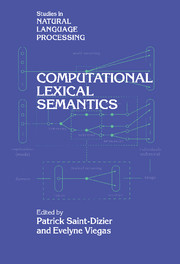
-
Select format
-
- Publisher:
- Cambridge University Press
- Publication date:
- 29 September 2009
- 24 February 1995
- ISBN:
- 9780511527227
- 9780521444101
- 9780521023207
- Dimensions:
- (228 x 152 mm)
- Weight & Pages:
- 0.783kg, 458 Pages
- Dimensions:
- (228 x 152 mm)
- Weight & Pages:
- 0.675kg, 460 Pages
You may already have access via personal or institutional login
Book description
Lexical semantics has become a major research area within computational linguistics, drawing from psycholinguistics, knowledge representation, computer algorithms and architecture. Research programmes whose goal is the definition of large lexicons are asking what the appropriate representation structure is for different facets of lexical information. Among these facets, semantic information is probably the most complex and the least explored. Computational Lexical Semantics is one of the first volumes to provide models for the creation of various kinds of computerized lexicons for the automatic treatment of natural language, with applications to machine translation, automatic indexing, and database front-ends, knowledge extraction, among other things. It focuses on semantic issues, as seen by linguists, psychologists and computer scientists. Besides describing academic research, it also covers ongoing industrial projects.
Reviews
'This volume is a remarkable collection of papers, supported by leading researchers in the field of natural language modeling and processing … the book is composed of 20 outstanding papers …'
Source: Zentralblatt MATH
Contents
Metrics
Altmetric attention score
Full text views
Full text views help Loading metrics...
Loading metrics...
* Views captured on Cambridge Core between #date#. This data will be updated every 24 hours.
Usage data cannot currently be displayed.
Accessibility standard: Unknown
Why this information is here
This section outlines the accessibility features of this content - including support for screen readers, full keyboard navigation and high-contrast display options. This may not be relevant for you.
Accessibility Information
Accessibility compliance for the PDF of this book is currently unknown and may be updated in the future.


